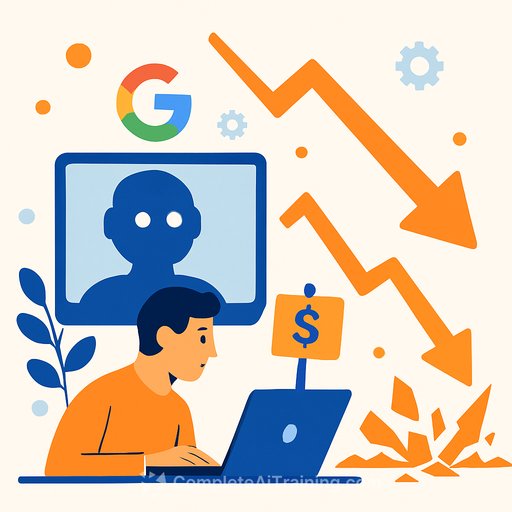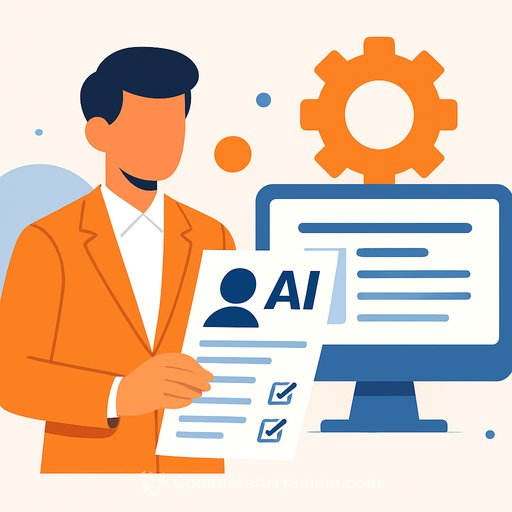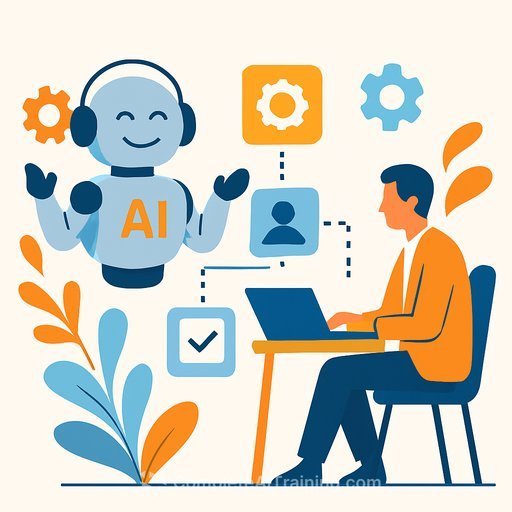Google AI Mode Goes Global: The End of Organic Traffic as We Know It?
Google’s rollout of AI Mode in over 180 countries is more than just a new feature—it's reshaping how users interact with search results and threatening the traditional affiliate marketing model based on organic traffic. This AI Mode keeps users within Google’s platform by delivering direct answers and enabling real-time booking capabilities through partners like OpenTable and Resy.
For businesses that have relied on climbing search rankings, the impact is clear. Studies reveal a 34.5% drop in click-through rates (CTR) for the top search position when AI Overviews appear. Overall, Google’s top organic CTR has fallen from 28% to 19% since AI Overview expanded—a 32% decline. For affiliate marketers, this shift represents an existential challenge.
The Perfect Storm: AI Overviews Meet Agentic Capabilities
Google’s AI Mode now goes beyond summarizing search results. It actively scans real-time availability on booking platforms and offers users direct options with links to complete reservations. This transition moves Google from being a search tool to becoming a task completion platform, keeping users inside its ecosystem.
Service businesses that once depended on organic traffic for bookings face a new reality. When users can ask the AI to “find a table for four at an Italian restaurant downtown tonight” and get instant options, visits to restaurant websites or affiliate platforms drop steeply. This mirrors trends seen with platforms like TikTok GO, which challenge Google’s local search dominance by becoming destinations rather than starting points.
However, Google’s vast search infrastructure and established partnerships allow it to execute this shift globally, nearly overnight. The move from browser extensions like Honey to embedded AI agents reflects a natural evolution in how platforms capture affiliate value. Unlike Honey, which had controversies over commission hijacking, Google’s integration comes with the legitimacy of being the search engine itself.
From Browser Extensions to AI Agents: The Evolution of Affiliate Disruption
The path from Honey’s $4 billion exit in 2020 to Google’s AI Mode highlights a major shift in affiliate marketing disruption. Browser extensions intercepted affiliate commissions after clicks, but Google’s AI Mode prevents the need for clicks altogether.
With AI Mode providing real-time booking capabilities directly, the traditional affiliate model—where users visit third-party sites for research and purchase—is becoming obsolete. This "zero-click" evolution means affiliate marketers face revenue loss not due to hijacked commissions but because users never leave Google’s interface.
The Affiliate Marketing Reckoning
AI Overviews now appear in more than 35% of U.S. desktop Google searches, with adoption accelerating worldwide. Early data from Italy shows general information sites losing 30–40% of their traffic after AI Overview launched. Affiliate marketers, particularly in travel, dining, and entertainment sectors, are seeing direct threats as Google partners with OpenTable, Ticketmaster, and StubHub to facilitate bookings within its AI Mode.
While past debates centered on whether Honey’s extension practices were affiliate fraud, Google’s AI Mode achieves a more complete shift by eliminating the need for affiliate sites in the conversion path. This is the logical extension of Google’s crackdown on affiliate content—why let third parties capture value when Google can deliver answers and solutions itself?
The New Intermediary Economy
Google positions AI Mode as a solution to problems created by browser extensions like Honey. Honey faced lawsuits over commission theft, but Google frames AI Mode as improving user experience by removing the need for multiple site visits.
Ryan Hudson, Honey’s founder, now leads PIE (People’s Internet Experiment), promising users control over ads while maintaining affiliate revenue. Critics argue this is a repackaging of the same value extraction. Google, by contrast, sidesteps these issues by acting as the direct service provider rather than an intermediary.
Google’s expansion fits into a broader trend of platform consolidation. Just as TikTok GO targets local search revenue with creator-driven affiliate models, Google uses AI to keep users engaged and complete transactions without leaving its environment. This positions Google as a digital concierge, cutting out traditional affiliate middlemen.
The Winners and Losers in Google’s New World Order
Not all sites suffer equally. Expert blogs, technical sites, and educational platforms focused on depth see visibility gains of 15-45%, as AI favors authoritative content for complex topics. This rewards genuine expertise over mass-produced SEO content.
However, even when content is cited in AI Overviews, click-through rates fall sharply—below 5% on desktop and 7% on mobile. For affiliate marketers, this means more visibility but less traffic and fewer conversions. The paradox is clear: authority without the traffic needed for monetization.
The Path Forward: Adaptation or Extinction
Affiliate marketers must adapt or risk extinction. Traditional SEO strategies focused on featured snippets and topical authority are less effective when AI synthesizes and delivers answers directly within Google.
The future lies in building influence beyond search. This includes growing email lists, social media followings, and direct brand partnerships—channels where marketers control the relationship instead of relying on Google’s algorithms. Authentic, experience-based content remains crucial, but even that may not guarantee traffic under AI Mode’s dominance.
The Monetization Dilemma
Google faces a tricky balance: it earns revenue from ads but reduces traffic to advertiser-supported sites through AI-powered answers. This dynamic resembles a classic case of a platform undermining its own ecosystem.
The recent introduction of paid ads within AI Overviews, announced at Google Marketing Live 2025, acknowledges this tension. Affiliate marketers now compete not only for organic visibility but also for costly paid placements inside AI-generated content—a steeper challenge than traditional PPC campaigns.
The Global Stakes
Rolling out AI Mode simultaneously in 180 countries signals Google’s strong commitment to this approach. Unlike past features tested regionally first, this global launch means affiliate marketers worldwide face immediate disruption without warning.
Survival depends on early recognition of the shift and investment in direct audience relationships rather than dependence on Google’s search traffic.
Conclusion: From Honey’s Disruption to Google’s Dominion
Google’s AI Mode expansion marks the latest phase in affiliate marketing disruption, following the browser extension era exemplified by Honey. For marketers built on organic search, this change demands a fundamental rethink of their business models.
Success will come to those who see AI Mode as a signal to evolve—building direct audience connections, developing authoritative content that AI cites, and creating revenue streams independent of search engine traffic.
The journey from Honey’s $4 billion exit to the launch of PIE highlights ongoing tensions between user empowerment and platform profitability. Google’s AI Mode suggests the future may be less about user control and more about which AI agent manages interactions.
The affiliate marketing industry has faced major shifts before—from Google’s algorithm updates to social commerce to browser extension controversies. This AI-driven change might be the most significant yet, but it also offers opportunities for those willing to adjust.
The question is not if AI will reshape affiliate marketing, but whether marketers can reshape themselves fast enough to stay relevant in this evolving landscape.
Your membership also unlocks:





